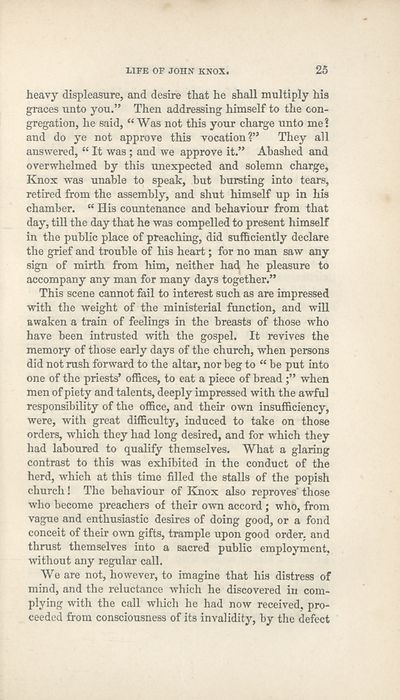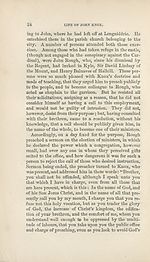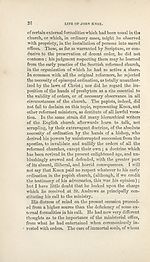Download files
Complete book:
Individual page:
Thumbnail gallery: Grid view | List view

LIFE OF JOHN KNOX.
25
heavy displeasure, and desire that he shall multiply his
graces unto you.” Then addressing himself to the con¬
gregation, he said, “Was not this your charge unto me!
and do ye not approve this vocation?” They all
answered, “ It was ; and we approve it.” Abashed and
overwhelmed by this unexpected and solemn charge,
Knox was unable to speak, but bursting into tears,
retired from the assembly, and shut himself up in his
chamber. “ His countenance and behaviour from that
day, till the day that he was compelled to present himself
in the public place of preaching, did sufficiently declare
the grief and trouble of his heart; for no man saw any
sign of mirth from him, neither had he pleasure to
accompany any man for many days together.”
This scene cannot fail to interest such as are impressed
with the weight of the ministerial function, and will
awaken a train of feelings in the breasts of those who
have been intrusted with the gospel. It revives the
memory of those early days of the church, when persons
did not rush forward to the altar, nor beg to “ be put into
one of the priests’ offices, to eat a piece of bread ;” when
men of piety and talents, deeply impressed with the awful
responsibility of the office, and their own insufficiency,
were, with great difficulty, induced to take on those
orders, which they had long desired, and for which they
had laboured to qualify themselves. What a glaring
contrast to this was exhibited in the conduct of the
herd, which at this time filled the stalls of the popish
church! The behaviour of Knox also reproves' those
who become preachers of their own accord ; who, from
vague and enthusiastic desires of doing good, or a fond
conceit of their own gifts, trample upon good order, and
thrust themselves into a sacred public employment,
without any regular call.
We are not, however, to imagine that his distress of
mind, and the reluctance which he discovered in com¬
plying with the call which he had now received, pro¬
ceeded from consciousness of its invalidity, by the defect
25
heavy displeasure, and desire that he shall multiply his
graces unto you.” Then addressing himself to the con¬
gregation, he said, “Was not this your charge unto me!
and do ye not approve this vocation?” They all
answered, “ It was ; and we approve it.” Abashed and
overwhelmed by this unexpected and solemn charge,
Knox was unable to speak, but bursting into tears,
retired from the assembly, and shut himself up in his
chamber. “ His countenance and behaviour from that
day, till the day that he was compelled to present himself
in the public place of preaching, did sufficiently declare
the grief and trouble of his heart; for no man saw any
sign of mirth from him, neither had he pleasure to
accompany any man for many days together.”
This scene cannot fail to interest such as are impressed
with the weight of the ministerial function, and will
awaken a train of feelings in the breasts of those who
have been intrusted with the gospel. It revives the
memory of those early days of the church, when persons
did not rush forward to the altar, nor beg to “ be put into
one of the priests’ offices, to eat a piece of bread ;” when
men of piety and talents, deeply impressed with the awful
responsibility of the office, and their own insufficiency,
were, with great difficulty, induced to take on those
orders, which they had long desired, and for which they
had laboured to qualify themselves. What a glaring
contrast to this was exhibited in the conduct of the
herd, which at this time filled the stalls of the popish
church! The behaviour of Knox also reproves' those
who become preachers of their own accord ; who, from
vague and enthusiastic desires of doing good, or a fond
conceit of their own gifts, trample upon good order, and
thrust themselves into a sacred public employment,
without any regular call.
We are not, however, to imagine that his distress of
mind, and the reluctance which he discovered in com¬
plying with the call which he had now received, pro¬
ceeded from consciousness of its invalidity, by the defect
Set display mode to:
![]() Universal Viewer |
Universal Viewer | ![]() Mirador |
Large image | Transcription
Mirador |
Large image | Transcription
| Antiquarian books of Scotland > Scotland/Scots > Life of John Knox ; and, The life of Alexander Henderson > (43) |
|---|
| Permanent URL | https://digital.nls.uk/131832820 |
|---|
| Description | Thousands of printed books from the Antiquarian Books of Scotland collection which dates from 1641 to the 1980s. The collection consists of 14,800 books which were published in Scotland or have a Scottish connection, e.g. through the author, printer or owner. Subjects covered include sport, education, diseases, adventure, occupations, Jacobites, politics and religion. Among the 29 languages represented are English, Gaelic, Italian, French, Russian and Swedish. |
|---|

